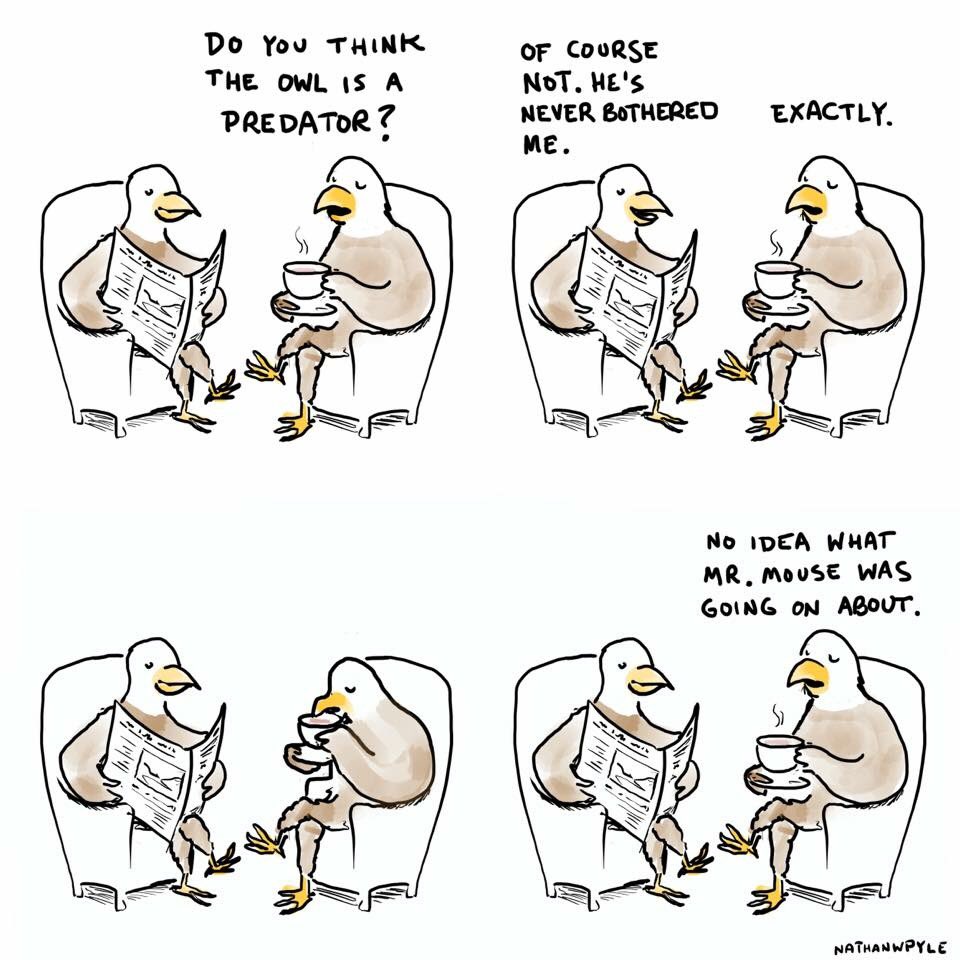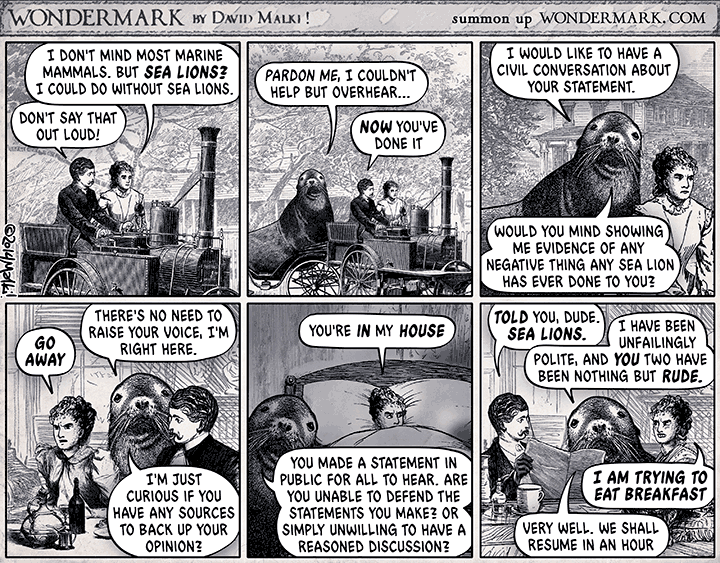Posts
Last edited: Mar 23, 2018, 5:42pm -0600
How to not be a white male asshole, by a former offender
Huge thanks to Caitlin Jarvis for editing, contributing to, and proofreading to this post.
First off, let’s start off with some assumptions. You, dear reader, don’t intend to cause anyone harm. You have good intentions, see yourself as a good person, and are interested in self improvement. That’s great!
Second, I don’t actually know for sure if I’m not still a current offender. I might be! It’s certainly something I’ll never be done working on.
1. You don’t know what others are going through
Unfortunately, your good intentions are not enough to make sure the experiences of others are, in fact, good because we live in a world of asymmetric information. If another person’s dog just died unbeknownst to you and you start talking excitedly about how great dogs are to try and cheer a sad person up, you may end up causing them to be even sadder. You know things other people don’t, and others know things you don’t.
So when I say that if you are a white man, there is an invisible world of experiences happening all around you that you are inherently blind to, it’s because of asymmetric information. You can’t know what others are going through because you are not an impartial observer of a system. You exist within the system.

Let me show you what I mean: did you know a recent survey found that 81 percent of women have experienced sexual harassment of some kind? Fully 1 out of every 2 women you know have had to deal specifically with unwanted sexual touching.
What should have been most amazing about the #MeToo movement was not how many women reported harassment, but how many men were surprised.
2. You can inadvertently contribute to a racist, sexist, or prejudiced society
I previously wrote a lot about how small little interactions can add up, illustrating that even if you don’t intend to subject someone to racism, sexism, or some other prejudice, you might be doing it anyway. Intentions are meaningless when your actions amplify the negative experience of someone else.
An example from Maisha Johnson in Everyday Feminism:
Black women deal with people touching our hair a lot. Now you know. Okay, there’s more to it than that: Black women deal with people touching our hair a hell of a lot.
If you approach a Black woman saying “I just have to feel your hair,” it’s pretty safe to assume this isn’t the first time she’s heard that.
Everyone who asks me if they can touch follows a long line of people othering me – including strangers who touch my hair without asking. The psychological impact of having people constantly feel entitled my personal space has worn me down.
Another example is that men frequently demand proof. Even though it makes sense in general to check your sources for something, the predominant response of men when confronted with claims of sexist treatment is to ask for evidence. Because this happens so frequently, this action itself contributes to the sexist subjugation of women. The parallel universe women live in is so distinct from the experiences of men that men can’t believe their ears, and treat the report of a victim with skepticism.
As you might imagine, this sort of effect is not limited to asking women for evidence or hair touching. Microaggressions are real and everywhere; the accumulation of lots of small things can be enormous.
If you’re someone in charge of building things, this can be even more important and an even greater responsibility. If you build an app that is blind to the experiences of people who don’t look or act like you, you can significantly amplify negative experiences for others by causing systemic and system-wide issues.
3. The only way to stop contributing is to continually listen to others
If you don’t already know what others are going through, and by not knowing what others are going through you may be subjecting them to prejudice even if you don’t mean to, what can you do to help others avoid prejudice? You can listen to them! People who are experiencing prejudice don’t want to be experiencing prejudice and tend to be vocal about the experience. It is your job to really listen and then turn around and change the way you approach these situations in the future.
4. How do I listen?
To listen to someone, you need to have empathy. You need to actually care about them. You need to process what they’re saying and not treat them with suspicion.
Listening is very different from interjecting and arguing. Listening to others is different from making them do the work to educate you. It is your job to find the experiences of others you haven’t had and learn from them without demanding a curriculum.
When people say you should just believe marginalized people, no one is asking you to check your critical thinking at the door. What you’re being asked to do is to be aware that your incredulity is a further reminder that you are not experiencing the same thing. Worse - white men acting incredulous is so unbelievably common that it itself is a microaggression. Don’t be a sea lion:

Aside about diversity of experience vs. diversity of thought.
When trying to find others to listen to, who should you find? Recently, a growing number of people have echoed that all that’s really required of diversity is different viewpoints, and having diversity of thought is the ultimate goal.
I want to point out that this is not the kind of diversity that will be useful to you. It’s easy to have a bunch of different opinions and then reject them when they complicate your life. What you want to be listening to is diversity of experience. Some experiences can’t be chosen. You can choose to be contrarian, but you can’t choose the color of your skin.
5. Where do I listen?
What you need is a way to be a fly on the wall and observe the life experiences of others through their words and perspectives. Being friends and hanging out with people who are different from you is great. Getting out of monocultures is fantastic. Holding your company to diversity and inclusion initiatives is wonderful.
But if you still need more or you live somewhere like Utah?
What if there was a website where people from all walks of life opted in to talking about their day and what they’re feeling and experiencing from their viewpoint in a way you could read? It’d be almost like seeing the world through their eyes.
Yep, this blog post is an unsolicited Twitter ad. Twitter definitely has its share of problems, but after writing about how I finally figured out Twitter, in 2014 I decided to embark on a year-long effort to use Twitter (I wasn’t really using it before) to follow mostly women or people of color in my field and just see what the field is like for them on a day to day basis.
Listening to others in this way blew my mind clean open. Suddenly I was aware of this invisible world around me, much of which is still invisible. Now, I’m looking for it, and I catch glimpses. I would challenge anyone and everyone to do this. Make sure the content you’re consuming is predominantly viewpoints from life experiences you haven’t had.
If you need a start, here are some links to accounts to fill your Twitter feed up with:
You can also check out who I follow, though I should warn I also follow a lot of political accounts, joke accounts, and my following of someone is not an endorsement.
It’s also worth pointing out that no individual can possibly speak for an entire class of people, but if 38 out of 50 women are saying they’re dealing with something, you should listen.
6. Does this work?
Listening to others works, but you don’t have to just take my word for it. Here are two specific and recent experience reports of people turning their worldview for the better by listening to others:
You can see how much of a profound and fast impact this had on me because by early 2015, only a few months into my Twitter experiment, I was worked up enough to write my unicycle post in response to what I was reading on Twitter.
Having diverse perspectives in a workplace has even been shown to increase productivity and increase creativity.
7. Don’t stop there!
Not everyone is as growth-oriented as you. Just because you’re listening now doesn’t mean others are hearing the same distribution of experiences.
If this is new to you, it’s not new to marginalized people. Imagine how tired they must be in trying to convince everyone their experiences are real, valid, and ongoing. Help get the word out! Repeat and retweet what women and minorities say. Give them credit. In meetings at your work, give credit to others for their ideas and amplify their voices.
Did you know that non-white or female bosses who push diversity are judged negatively by their peers and managers but white male bosses are not? If you’re a white male, use your position where others can’t.
If you need an example list of things your company can do, here’s a list Susan Fowler wrote after her experience at Uber.
Speak up, use your experiences to help others.
8. Am I not prejudiced now?
The asymmetry of experiences we all have means we’re all inherently prejudiced to some degree and will likely continue to contribute to a prejudiced society. That said, the first step to fixing it is admitting it!
There will always be work to do. You will always need to keep listening, keep learning, and work to improve every day.